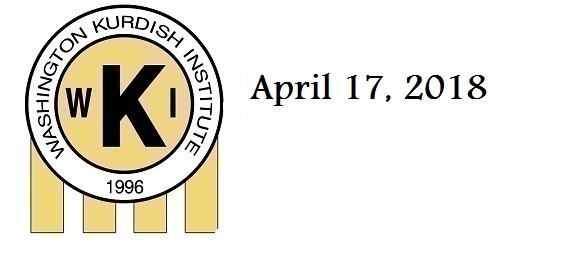970
Iran
- Iran’s Supreme Court has sentenced to death Ramin Hossein Panahi, a member of a Kurdish opposition party. Last June, Panahi was captured, unarmed, by Iran’s security forces during an ambush against Peshmergas from the Kurdish Komala party. He was injured and taken to prison after receiving treatment. Amnesty International has expressed concerned about the fairness and humaneness of the trial, as Panahi was found to have physical evidence of torture on his body. Panahi’s lawyer said that, despite the fact that Panahi was captured unarmed, his client was charged with “taking up arms against the state.”
- In response to the Iranian government’s decision to shut down the Siranband-Baneh border crossing, between Iraqi Kurdistan and Iran, hundreds of Kurdish business owners organized a strike on April 15. The strike took place in Baneh district, with business owners demanding the government reopen the border crossing, arguing that the closing had negatively affected thousands and contributed to wide unemployment in the nearby Kurdish areas.
- After recent assassinations of Kurdish Iranian opposition figures in Iraqi Kurdistan, the head of the Iranian Freedom Party, Hussein Yazdanpanah, survived an assassination attempt in Erbil on April 12. The Iranian Freedom Party and other Kurdish opposition parties based in Iraqi Kurdistan accused the Iranian regime of orchestrating the attempted assassination and further accused the Iranian government of targeting Kurdish opposition parties and their leadership in recent weeks.
Iraq
- In Iraqi Kurdistan, the Kurdish-dominant political parties launched their campaigns for the upcoming Iraqi Parliamentary elections which are to take place on May 12. Similar to the 2014 election, the majority of these parties decided to run alone, except for a major coalition between the Change Movement (Goran), the Islamic Group (Komal), and the Alliance for Democracy and Justice (a new party headed by former Kurdistan Regional Government Prime Minister Barham Salih), and three other minor coalitions. The Kurdistan Election Commission announced that 25 election blocks will participate in the election, with 3,144,370 eligible voters recorded in the region. In Kirkuk, the Democratic Party of Kurdistan (KDP) decided to boycott the elections in this disputed territory, while the other major Kurdish political parties decided to participate and recently kicked off their campaigns in the area.
- On the anniversary of the Anfal Campaign, a genocidal military incursion undertaken by the Saddam Hussein regime against the Kurdistan region in 1988, the Kurdistan Regional Government (KRG) of Iraq released a statement saying: “In addition to killing about 182,000 innocent civilians, in a mass-extermination campaign, thousands of villages were destroyed, turning Kurdistan into a scorched land.” Several Kurdish political parties decided to temporarily suspend their campaigns this past Saturday in honor of the 180,000 Kurds killed by the Hussein regime as a part of this genocide.
- Kirkuk’s security continues to deteriorate since October 16, 2017, after the Iraqi central government forces and Iranian-backed Iraqi militias (People’s Protection Units [PMUs]) expelled Peshmerga forces and took control of the area. Recently, insurgents orchestrated an Improvised Explosive Device (IED) attack against a Shia Turkmen candidate, resulting in one civilian death and five civilians injured.
- Turkish army forces deployed in the Amedi district of Duhok recently refused to allow the family of three Kurdish brothers killed in Turkish airstrikes in the region to recover the corpses of their family members for burial. These recent killings are the second in a month undertaken by Turkish forces, the first occurring on March 21 when the Turkish military conducted airstrikes that killed three Kurds picnicing in the mountains.
Syria
- The homes of displaced Kurdish families in Afrin are now occupied by Turkish-backed Syrian Islamist militias. Kurdish officials in Syria accused Turkey of engaging in ethnic cleansing and forced demographic change in Afrin. According to Kurdish sources in Syria, these Islamist militia groups are populating Kurdish areas with non-Kurdish, mostly Arab, individuals from Ghouta. Thousands of displaced Kurds remained blocked from returning to their homes in Afrin.
- A recent report by the Syrian Observatory for Human Rights said that these Turkish-backed militias are continuing to detain and torture numerous civilians in Afrin.
- The Syrian Democratic Forces (SDF) recently announced the capture of the suspected killer of Omar Alush, a famous Kurdish figure and former member of the Raqqa Civil Council. The SDF said a terrorist cell was involved in the assassination and accused Turkish intelligence of being involved in the murder.
Turkey
- In response to Turkey’s Deputy Prime Minister expressing a strong possibility of calling early elections, the Co-Chair for the Kurdish-dominant HDP political party, Pervin Buldan, stated that his party would accept such a change and called on all Kurdish provinces to be ready in case of these early elections. Buldan’s statement said that the ruling Justice and Development Party (AKP) of Turkey’s current President Recep Tayip Erdogan should “get ready to taste the Kurdish slap in the elections.” Meanwhile, Turkey’s government has added 6 more months onto the prison sentence of former HDP Co-Chair Figen Yuksekdag for “opposing the electoral prohibitions.” On November 7, 2017, Yuksekdag was sentenced to one year in prison for “spreading terrorist propaganda,” a charge that is often used by the Erdogan regime against Kurdish politicians and activists who have expressed legitimate criticisms against Turkey’s government.

